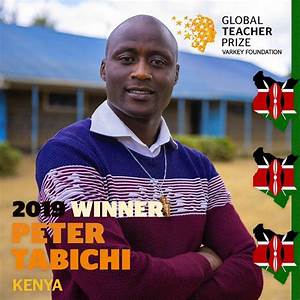TRIBUTE | Peter Tabichi: When a teacher’s reward is not in heaven!
“Seeing my learners grow in knowledge, skills and confidence is my greatest joy in teaching! When they become resilient, creative and productive in the society, I get a lot of satisfaction for I act as their greatest destiny enabler and key that unlocks their potential in the most exciting manner,” – Global Teacher Prize 2019 Award Winner, Peter Tabichi.

Teachers are regarded as the strongest pillar of the society, for it is undeniable that behind most successful men and women in our society, there are some great teachers! Thus, teaching is more than a profession; it is the mother of all occupations on earth. A teacher is like a potter who delicately shapes young impressionable minds and molds them into great, independent and confident characters.
When Hannah Wambui and Teresiah Kanini, two students of remote Keriko Mixed Day Secondary School of Pwani village in Kenya’s Nakuru province, curiously observed a strange chemical interaction in some plants around their community, they quickly ran to their science and mathematics teacher, Peter Tabichi, to intimate him about their discovery. These teenagers` discovery sparked an idea and with the help of their teacher, they developed their idea into an innovative way of generating electricity from plant extracts.
Wambui and Kanini successfully implemented their plant-based power generating project called Waka Cell [ Waka coined from the first two letters of both Wambui and Kanini], eventually competing with their innovation in the chemistry category of the Kenya Science and Engineering Fair. The duo defied all odds to successfully emerge overall winners of the contest – beating bigger, well-known schools in the competition. Keriko is a far-flung school with only one computer, no library – and where 36-year-old Peter Tabichi donates 80 percent of his monthly salary to pay for the tuition of vulnerable children and orphans.
Tabichi was inspired to become a teacher by his father and teaches in a school where “95 percent of pupils hail from poor families, almost a third are orphans or have only one parent, and many go without food at home. Drug abuse, teenage pregnancies, dropping out early from school, young marriages and suicide are common. Turning lives around in a school with only one computer, poor internet, and a student-teacher ratio of 58:1, [was] no easy task, not least when to reach the school, students must walk 7km along roads that become impassable in the rainy season,” according to a statement posted on the Global Teacher Prize website.
“Despite teaching in a school with only one desktop computer with an intermittent connection, Peter uses ICT in 80% of his lessons to engage students, visiting internet cafes and catching online content to be used offline in class. Through making his students believe in themselves, Peter has dramatically improved his pupils’ achievement and self-esteem. Enrolment has doubled to 400 over three years, and cases of indiscipline [had] fallen from 30 per week to just three. In 2017, only 16 out of 59 students went on to college, while in 2018, 26 students went to university and college,” added the post on the Prize’s website.
Tabichi, who led his poorly-resourced school to emerge victorious at Kenya`s science fair, later emerged among 10 finalists for the prestigious Global Teacher Prize for 2019. The 10 finalists were shortlisted from a 50 candidates list, which were also selected from an initial list of 10, 000 applicants from across the world. This was how he emerged winner of the prestigious Varkey Foundation Global Teacher Prize for 2019, worth USD 1 million. Tabichi’s giant stride was recognized by Kenya’s President Uhuru Kenyatta whose video message commending and congratulating Tabichi was broadcast at the award ceremony. Kenyatta had since committed to donating 20 million Kenyan shillings (USD 200, 000) to the Keriko secondary school to develop its infrastructure and encourage students to embrace Science, Technology, Engineering and Mathematics (STEM) subjects.
There`s an African saying that: “Teachers’ reward is in heaven” which simply means the reward for teachers’ daily sacrifice, toil and hard work in shaping the minds and lives of the future leaders of the society can never be adequately rewarded in monetary terms. Instead, it can only be rewarded in heaven, impliedly by God himself; considering its sheer magnitude. This, however, can be debatable in the case of Peter Tabichi, the passionate Kenyan science teacher whose dedication and hard work has doubtlessly, made the African continent proud!









